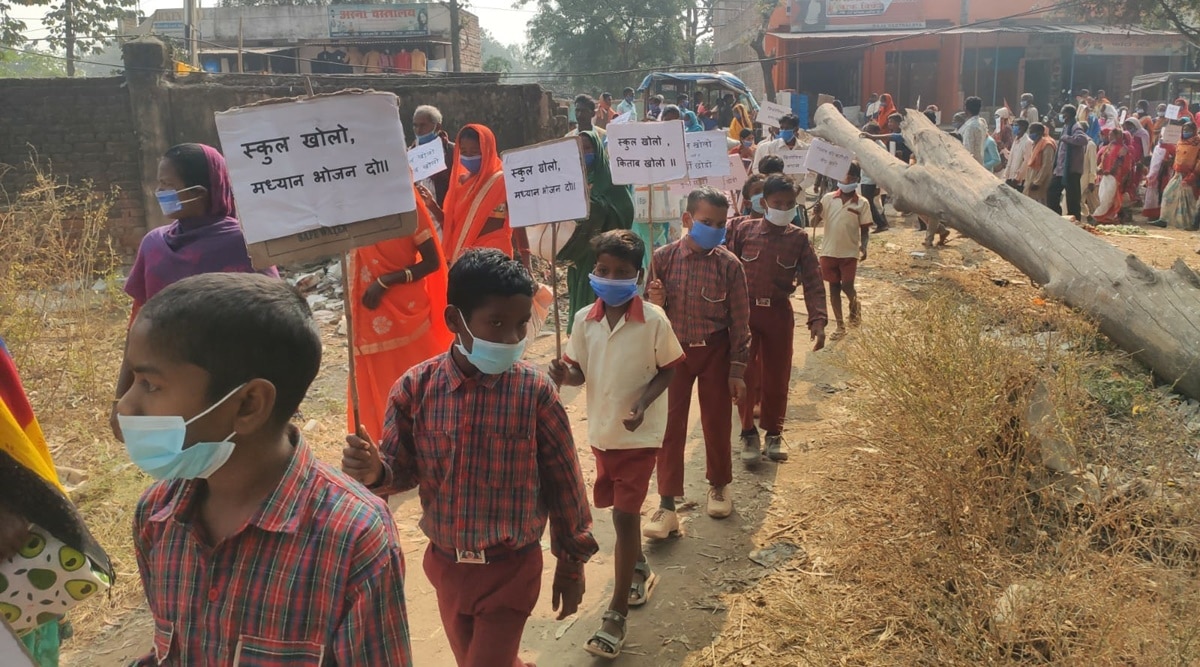Jharkhand: No access to online courses, primary school students demand the reopening of schools
[ad_1]
It’s Friday afternoon, seven-year-old Amita Kumari, who is from a tribal community and was in class 2 when the Covid pandemic hit early last year, is among the hundred or so elementary school students of the Manika block of Latehar district in Jharkhand. participating in the “School Kholo†event.
Students and their parents marched from the Manika Block headquarters, covering about a kilometer, and ending the march at Manika High School to protest the alleged government delay in opening primary schools; of class 1-5, which they say “hinders their growth”.
The rally was organized by Gram Swaraj Mazdoor Sangh (GSMS), a local organization of rural workers, and protesters said that in areas like Manika, very few children can study online due to poor internet connection and lack of smart phones.
Jharkhand government data, given to the assembly in September, indicates that only 35% of students have benefited from online content broadcast on Whatsapp, Doordarshan and radio. He said the learning content is “shared daily for over a year through 47,000 WhatsApp groups created at all levels, covering around 13 lakh students.” Up to 37 lakh students are enrolled in grades 1-8.
But children like Amita are not among that number.
A GSMS survey found that online education had an impact on learning outcomes. “During a village-to-village campaign prior to the rally, our volunteers found that most primary school children cannot read a single sentence. This is consistent with the results of the Schoolchildren Online and Offline Learning (SCHOOL) survey in 15 states earlier this year, which showed that among poor rural families, only 25% of children in the classroom 3 were able to read a simple sentence, â€said James Herenz, GSMS member.
What compounds the problem for most parents in Manika is that they cannot afford private lessons for their children. Amita’s father, Kharidan Oraon, a day laborer, says he worked in Haryana, melting used batteries, earning 300 rupees a day. “On 9,000 Rs, I sent Rs 7,000 home… Five months ago, I broke my hand in an accident and since then, I can no longer win, and we live on loans. I cannot afford an online education for my three children, â€he said.
Protesters on Friday questioned why schools continued to remain closed as crowds are allowed in markets, weddings and even cricket stadiums. “A huge crowd was allowed to attend a meeting delivered by Chief Minister Hemant Soren in Daltonganj, just an hour from Manika. A few weeks earlier, 40,000 people had been authorized to tread a stadium in Ranchi for the India-New Zealand cricket match… But our children’s future is being ruined, â€they said.
Government sources said the likelihood of a third wave of Covid and the recent fear of the Omicron variant delayed the decision. Latehar deputy commissioner Abu Imran said the directions for opening primary schools will come from state headquarters.
Kiran Kumar Pasi, state project director, Jharkhand Education Project Council – an autonomous body under the Department of School Education and Literacy – said he made various representations to the Department of Disaster Management to open schools . “We are awaiting their green light. Sources said it was up to the chief minister and the health minister to make a decision, as they are the first and second commanders of the Disaster Management Authority, respectively. Both were unavailable for comment.
[ad_2]


Comments are closed.